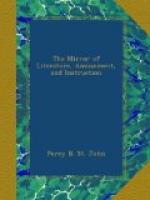Three Mile Cross, Feb 1829.
Sharpe’s Magazine.
[21] Mr. Taylor’s transition
of Goethe’s Iphigenia in Tauris; one
of the finest plays out of Shakspeare, and
now extremely rare.
* * * * *
ILLUSTRIOUS FOLLIES.
We have been amused with a light pattering paper in Nos. 1. and 2. of Sharpe’s London Magazine—entitled “Illustrious Visiters.” Its only fault is extreme length, it being nearly thirty pages, and, as some people would say, “all about nothing.” But some will think otherwise, and smile at the sly shafts which are let fly at our national follies, of which, it must be owned, we have a very great share. We ought to premise that the framework of the satire is a visit of the Court Cards to our metropolis, a pretty considerable hit at some recent royal visits. Of course, they see every thing worth seeing, and some of their remarks are truly piquant. The spirit, or fun, of the article would evaporate in an abridgment, so we will endeavour to give a few of the narrator’s best points:—
The Arrival.
“On the day of their landing, the town of Dover was in a state of general excitement; bells were ringing, colours flying, artillery saluting; and the loyal inhabitants crowded forth to peep at the illustrious potentates. Often and often, even from our earliest years, have we heard of the fame of these kings and queens. Their pictures have been familiar to every eye; dealers transmitted them into every hand; their colourless extraordinary faces, their shapeless robes of every tint in the rainbow, and their sky-blue wigs, are as well known to every Englishman, as the head of his own revered monarch on a two-and-six-penny piece. Whenever there is any thing to be seen, an Englishman must go and see it; and, in the eager warmth of excited spirits, he will run after any vehicle, no matter whether caravan or carriage; no matter whence it comes or whither it goes; no matter whether its contents be a kangaroo or a cannibal chief, a giraffe or a Princess Rusty Fusty. He hears of an arrival from foreign parts, that is sufficient; a crowd is collected, and the ’interesting stranger’ is cheered with enthusiasm, and speeds from town to town, graced with all the honours of extemporaneous popularity.”
“I have already hinted that I consider it no business of mine to inquire why these potentates came to England; perhaps it was no business of theirs that brought them, but rather a party of pleasure; one of the results of a general peace, which is very far from producing general quietness; for when the sovereigns of remote countries become upon visiting terms, hospitality throws wide her gates, and loyalty is uproarious. They came, no doubt, like all our other royal exotics, from the unfortunate sovereigns of the Sandwiches down to the Don of yesterday, to see and to be seen; so, whilst the inhabitants of Dover shouted round their carriages, they condescendingly acknowledged the greetings they received, and proceeded on their journey towards the metropolis.”




